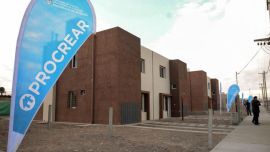Less than a month before candidacies are to due to be in written on stone, politics is moving at breakneck speed in Argentina. And in the build-up to June 22, some politicians are getting bruised along the way.
Seven days ago, Cristina Fernández de Kirchner played the heroine in an Evita-style enouncement, before she became the devil again three days later, sitting in court for the first time to listen to a prosecutor reading through a large pile of criminal charges against her. Elsewhere, just a mere two weeks ago, the Peronist governor of Córdoba, Juan Schiaretti, seemed to be anointed with special kingmaking powers. This week, he could not get five people to agree on how to sort out a presidential candidacy.
Fasten your seatbelts, because this is not over yet. The UCR, or Radicals, will hold their national convention on Monday, at which the party will decide what to do about their relationship with President Mauricio Macri’s PRO party and the Cambiemos ruling alliance. Rather than a normal governing coalition, Cambiemos has mostly been an electoral front since it was first created in early 2015, the year in which it unexpectedly catapulted Macri to the presidency. But things have changed. Now Macri needs the Radicals more than they need him, with the president eager to sure up his re-election hopes, largely impaired by the economic quagmire that started a year ago with a sharp devaluation of the peso.
The Radicals have three options: First, they can leave Cambiemos alto - gether. Second, they can stay, provided they get more space and clout in the coalition (such as the vice-presidential slot). Third, they can stay, provided they get more space in the coalition and crucially, the agreement that the coalition incorporate other players, like centrist Peronists.
Option one is very unlikely. For one, at this point, the Radicals have (almost) nowhere to go. The second-best option is former economy minister Roberto Lavagna, who this week finally confirmed he will run for president under the ‘Consenso19’ brand. The next day, Lavagna broke away from the Alternativa Federal group of centrists Peronists led by Schiaretti, because he refuses to participate in a primary. Lavagna’s detractors complain his ‘Consensus’ theme just means ‘Follow me’.
Option three is even less likely, this time because the president would not accept it. Macri has built his political reputation on the premise of differentiation – especially from the Peronist party. But even more relevant to the option, the president is committed to sticking with an economic programme that has fiscal austerity as its chief priority. This puts his Casa Rosada at odds with much of Argentina’s political establishment and their own economic teams, even at odds with some people within his own party.
That leaves the Radicals with the most probable option, number two. If it materialises, the Radicals would try to change the way decision-making is made within the structure of the coalition – and the party might get the veep slot on the ticket. Or, perhaps less likely within this more likely option, they might force the president to fight for his nomination in the August PASO primaries. Even less likely but probable in this maniac succession of events, they might try to force Macri out of the race in order nominate a more popular figure instead, namely the Governor of Buenos Aires Province María Eugenia Vidal.
All these options were already on the table before, of course. But they have been bolstered by Cristina Fernández de Kirchner’s upset decision not to head her own presidential ticket, passing the burden onto Alberto Fernández. He was a sharp Cabinet chief in the early Kirchner years, later a merciless critic of CFK’s second government (2011-2015), and always a skillful powerbroker who never ran for elected office, save for an obscure congressional slate in the City of Buenos Aires, in a coalition led by Domingo Cavallo. But he is hardly a popular figure who would deliver you masses of votes on his own.
Fernández de Kirchner’s risky move has rattled the stiffness of the electoral picture’s otherwise stubborn polarisation. Why shouldn’t Macri take a similar path? It would be, after all, a healthy acknowledgement of weakness.
From the start, the plot of this year’s election has been about poles and the intensity of them. If, like Fernández de Kirchner, Macri also moved to the centre, the partition would consolidate, but in more reasonable and less extreme terms, hopefully making the competition slightly more civilised. It would be good news for the country, even if it is bad news for the centrist opposition of Schiaretti, Lavagna, Sergio Massa and Juan Manuel Urtubey, the ones who were trying to find a place in the crack. Instead of melting, as was the case a few weeks ago, the poles might be expanding again. What if, at one point, they even meet in the middle?






















Comments